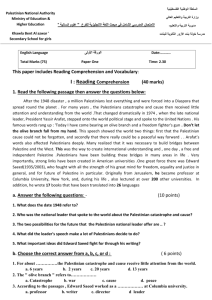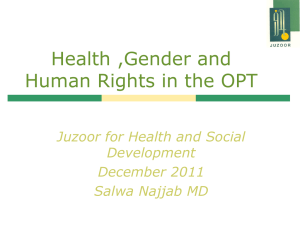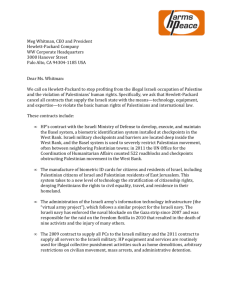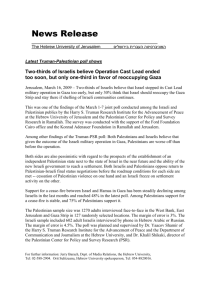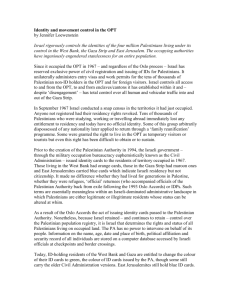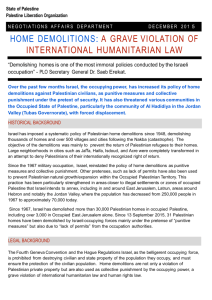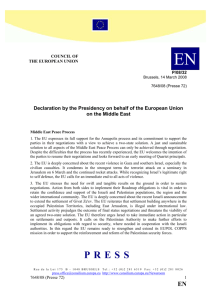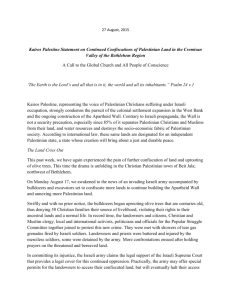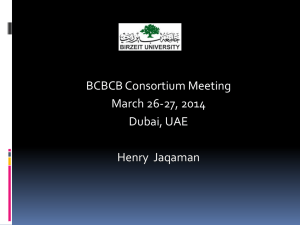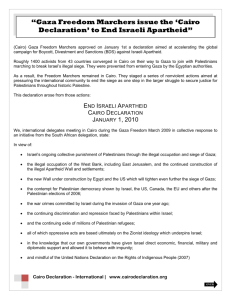Click here to Powerpoint Presentation
advertisement
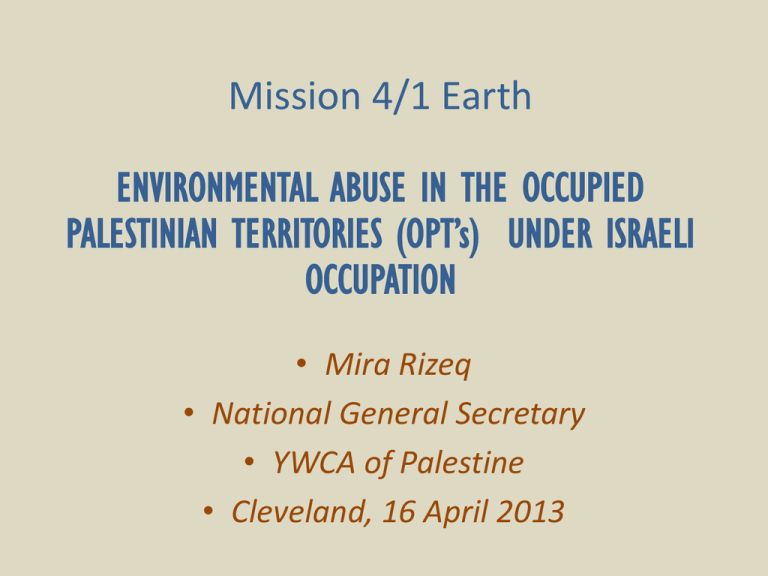
Mission 4/1 Earth ENVIRONMENTAL ABUSE IN THE OCCUPIED PALESTINIAN TERRITORIES (OPT’s) UNDER ISRAELI OCCUPATION • Mira Rizeq • National General Secretary • YWCA of Palestine • Cleveland, 16 April 2013 “To tend a garden is a precious thing, But dearer still the one where all may roam, The weeds of poison, poverty, and war, Demand your care, who call the earth your home.” KATHY GALLOWAY, attributed, Soul Weavings Environmental Abuse….or Challenges? • There are many environmental challenges facing the Palestinians – Solid Waste: environmental hazards – Waste water: lack of proper treatment – Water: control and pollution – Land Confiscations and erosion of Agriculture Land – House Demolitions – Industrial waste – Air pollution Solid Waste: A Real Hazard… • In the WBGS, 78.4% of the households dispose their solid wastes by throwing it in the nearest container • 21.6% throws it elsewhere or burns it. • Some 82.3% of the total solid waste in the WBGS is food waste. • Solid waste is often dumped uncontrolled and untreated into the open or burnt. There are water disparities and restrictions in accessing natural resources or pollution sources, in addition to air, water and solid wastes that are greatly threatening landscapes, human health, economic prosperity and ecosystems in Palestine. (EcoPeace – Friends of the Earth Middle East) The Situation of Sewage in WB/GS • 80% of domestic wastewater is discharged into the environment without treatment. (PASSIA) • Some 90,000 m of sewage are pumped into the sea every day 3 • About 40% of all sewage produced in the WB (including East Jerusalem) originates from Israeli settlers who dump raw sewage directly into the surrounding environment. (PWA through PASSIA) Water Control and Abuse • 450,000 settlers use more water than 2.3 million Palestinians. • Israeli settlements are built over the major aquifers in the OPT. • 80% of the available water in the OPT is diverted to Israeli settlements. • 56 water springs are located in the vicinity of Israeli settlements. • Palestinians are obliged to buy their own water from Israel. (UN – OCHA) • Over 70% of Palestinian communities located entirely or mostly in Area C are not connected to the water network and rely on tanked water at vastly increased cost Water Control and Abuse Palestinian domestic water consumption: 50 liters per capita per day. Israeli domestic water consumption: 280 liters per capita per day. (B’tselem via Ewash) Gaza water is contaminated; unfit for consumption, and suffers from high percentage of salinity. About 26% of diseases in Gaza are associated with water. (UNICEF) A Palestinian boys drinks water from a public tap at the United Nations Relief and Works Agency headquarters in the southern Gaza Strip Rafah refugee camp. Photograph: Said Khatib/AFP/Getty Images Water Control and Abuse It is estimated that if Palestinians were allowed a fair share of water resources and if restrictions in Area C were lifted, an additional agricultural production worth $1.22 billion could be generated yearly. (EWASH) Photo: Palestinian Solidarity Campaign (PSC) A “normal” day in Palestine that depicts mobility restrictions. Photo Courtesy by Photographer Ahmad Daghlas Land Confiscation and Degradation • Since 1967, more than 900,000 dunums of land have been confiscated and demolished for settlement use and access roads in the WB and Gaza. (555,000 dunums confiscated to construct the expansion and annexation wall) • In 2012, 540 Palestinian-owned structures in Area C, including 165 residential structures, were demolished due to lack of Israeli-issued permits, displacing 815 people, over half of them children. Abu Ghneim/Har Homa House Demolitions About 27,000 Palestinian homes and structures have been destroyed since 1967. Between 2000 and Aug. 2012, 467 structures were demolished, including 140 residential homes, displacing some 702 people. (ICAHD, through PASSIA) The Aftermath…..House Demolitions The Damage of Agriculture in Palestine • The agricultural output has been seriously damaged in Palestine. • The proportion of GDP earned from agriculture fell from 28% to 5.6% in the past twenty years. • The inability of farmers to cultivate or harvest their crops undermines the fragile Palestinian economy and makes arable subsistence for communities less feasible. • 24% of the Palestinian population in Area C are food insecure compared to 17% in the remainder of the West Bank. The Olive Trees • Out of the 7.6 million olive trees, over 2.1 million are inaccessible due to the separation wall, check points and other mobility restriction structures instituted by Israeli Occupation. • More than 80,000 Palestinian families depend on the annual olive harvest for their livelihoods . The olive oil industry makes up 4% of the agricultural income for the OPT. (UN – OCHA) • Since 2001, half a million olive trees have reportedly been uprooted in the OPT. Olive tree vandalized by settlers in the Tuwani fields, near the outpost of Havat Maon, South Hebron Hills, October 28, 2012. Photo by Guy/Taayush Bil’in: An olive tree is burning because of the tear gas canister – (2011, Demotix – The Network for Freelance Photojournalists) A Palestinian boy sits atop a pile of olive trees uprooted to make way for the Israeli separation wall surrounding the West Bank town of Al-Walaja. (Photo by Ryan Rodrick Beiler) White Phosphorous: Poisoning People • Israel has condemned for using whitephosphorous against the UN and other targets during airstrikes over Gaza • White phosphorous creates an intense and persistent burn emitting heat and absorbing liquid. It also can penetrate the body and poison organs. ”Despite the efforts of the Israeli government to suppress internationals from working in solidarity with the Palestinians, hope, like the olive tree, continues to grow and prosper from the most seemingly desolate of circumstances.” Andrew Long-Higgins serves as a Global Mission Intern in the Middle East and Europe area. His work with Global Ministries is funded by your offerings to Week of Compassion. 2013 “The earth is the Lord’s and all that is in it, the world and those who live in it.” (Psalm 24:1) Up Against the Wall – From Palestine to Mexico

